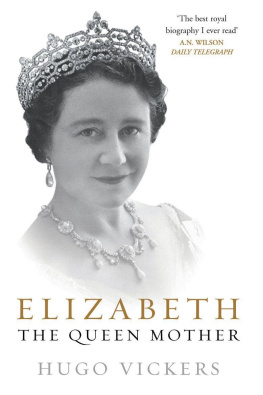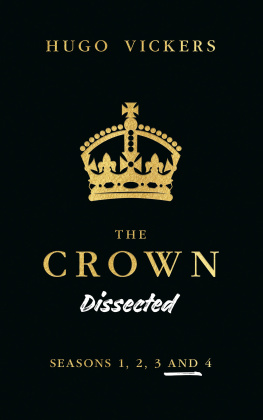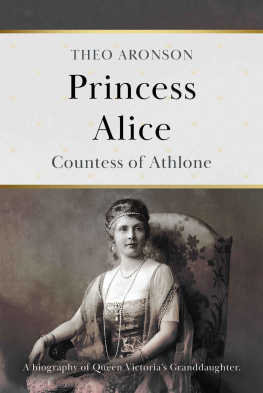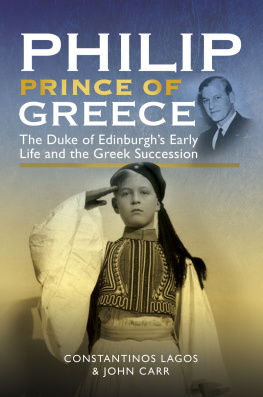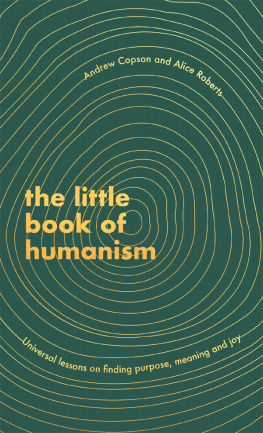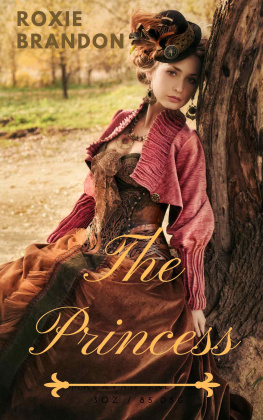Hugo Vickers - Alice: Princess Andrew of Greece
Here you can read online Hugo Vickers - Alice: Princess Andrew of Greece full text of the book (entire story) in english for free. Download pdf and epub, get meaning, cover and reviews about this ebook. year: 2002, publisher: St. Martins Press, genre: Non-fiction. Description of the work, (preface) as well as reviews are available. Best literature library LitArk.com created for fans of good reading and offers a wide selection of genres:
Romance novel
Science fiction
Adventure
Detective
Science
History
Home and family
Prose
Art
Politics
Computer
Non-fiction
Religion
Business
Children
Humor
Choose a favorite category and find really read worthwhile books. Enjoy immersion in the world of imagination, feel the emotions of the characters or learn something new for yourself, make an fascinating discovery.

- Book:Alice: Princess Andrew of Greece
- Author:
- Publisher:St. Martins Press
- Genre:
- Year:2002
- Rating:3 / 5
- Favourites:Add to favourites
- Your mark:
- 60
- 1
- 2
- 3
- 4
- 5
Alice: Princess Andrew of Greece: summary, description and annotation
We offer to read an annotation, description, summary or preface (depends on what the author of the book "Alice: Princess Andrew of Greece" wrote himself). If you haven't found the necessary information about the book — write in the comments, we will try to find it.
Alice: Princess Andrew of Greece — read online for free the complete book (whole text) full work
Below is the text of the book, divided by pages. System saving the place of the last page read, allows you to conveniently read the book "Alice: Princess Andrew of Greece" online for free, without having to search again every time where you left off. Put a bookmark, and you can go to the page where you finished reading at any time.
Font size:
Interval:
Bookmark:

The author and publisher have provided this e-book to you for your personal use only. You may not make this e-book publicly available in any way. Copyright infringement is against the law. If you believe the copy of this e-book you are reading infringes on the authors copyright, please notify the publisher at: us.macmillanusa.com/piracy.
Contents
To William M. Weaver, Jr, godfather and friend
Acknowledgements
On 9 December 1969, shortly before I left school, I was invited to dinner by the organist of St Georges Chapel, Windsor, Dr Sidney Campbell. After dinner, he took me over to St Georges Chapel, opening the north door with his key and turning the chapel lights on.
St Georges Chapel was arranged for the funeral next day of Princess Andrew of Greece, who had died at Buckingham Palace a few days before. In the quire, before the high altar, stood the bier, placed on the lift which would convey the coffin down into the royal vault below. Surrounding it were the great black and gold candlesticks, lately bequeathed to St Georges Chapel by the 7th Earl Stanhope, senior Knight of the Garter. I saw where the Queen and the other royal mourners would sit. The Princesss coffin was then resting, not far away, in the Albert Memorial Chapel.
The following day, in dense fog, the funeral took place. I had never been in St Georges Chapel at night, when it was empty. There was then no reason for me to suppose that the memorable scene would take on a greater significance in the years ahead.
In the summer of 1995, nearly quarter of a century later, I was at my desk at home when the telephone rang and Sir Brian McGrath, Prince Philips treasurer, called me. We had never met, but he told me that Princess Andrews surviving daughter, Princess George of Hanover, believed the time had come for a biography to be written of her mother. My name had been suggested, and if the idea appealed, perhaps I might like to come and see him and we could discuss it further.
Some days later I went to Buckingham Palace to meet Sir Brian, and he laid out the ground rules. Your job is to find a publisher and write the book, he said. My job is to open doors for you. Five years later, I am happy to report that this arrangement was fulfilled on both sides, Sir Brian not only opening doors for me, but inserting me at lunch tables, arranging interviews and gaining access for me to private archives. My first debt of gratitude is therefore to him.
This book was suggested by HRH Princess George of Hanover, and both she and HRH The Duke of Edinburgh have helped me immeasurably with my work. I enjoyed several meetings with Princess George both in Germany and in London, and she kindly answered a great number of questions, provided me with photographs and even translated an obituary of her mother from Greek into English for me. She and Prince George came over from Windsor to visit me in Hampshire in the summer of 1998 to witness the work in progress.
The Duke of Edinburgh also kindly talked to me about his mother, and was always prepared to answer written questions, of which I submitted a great number. He loaned me his mothers letters to him between 1924 and 1969, and allowed me access to certain other material in his archives, including the photographs in his fathers album between 1917 and 1931. He also agreed to read an early draft of the typescript, which prompted further questions and answers.
The support given by Princess Andrews grandson, Rainer von Hessen, has been immeasurable. He and I maintained a long correspondence throughout the years of research; he translated all the material from the University of Tbingen from German to English; he was ever willing to answer complicated questions about the intricacies of the family; and he guided me on many of the German aspects of the story. He interviewed Mrs Kthe Lindlar, Mrs Almuth Schmidt-Reuter and Mrs Else Stockmann in Cologne, which provided vital information on the Cologne period of his grandmothers life. He came to stay twice in Hampshire to advise me over these middle years and read early drafts of the book. In October 1999 he invited me to Wolfsgarten and guided me around Darmstadt. One of the field day activities of this part of the research was when I climbed a gate in order to find the tombs of Prince Alexander of Hesse and Princess Battenberg, in the grounds of Schloss Heiligenberg, trespassing providing an enjoyable contrast to the more sedentary days spent in archives and libraries.
The late HRH Princess Margaret of Hesse received me twice at Wolfsgarten in January 1996. I am also grateful to members of the royal family who granted me interviews, in particular, HRH The Prince of Wales and HRH The Princess Royal, and His Majesty King Constantine of Greece. Her Majesty Queen Elizabeth The Queen Mother talked of Princess Alice in Scotland and HRH The Princess Margaret, Countess of Snowdon, in Hampshire.
I visited Lady Katherine Brandram, Princess Alices niece, at her home in Marlow. I talked to Countess Mountbatten of Burma and Lord Brabourne in London in 1998, and Lady Pamela Hicks in London in 1999, as well as other members of the family: HRH Prince Alexander of Yugoslavia, the late HRH Prince Tomislav of Yugoslavia, HRH Princess Margarita of Baden, the late Princess Beatrix of Hohenlohe-Langenburg, Prince Alexander Romanoff, Lady Kennard and Lady Butter. Further help was given me on a non-attributable basis.
I have drawn on the benefit of a long conversation with the late HRH Princess Eugnie of Greece, whom I interviewed on another topic as long ago as February 1980. Princess Irina Bagration kindly gave me access to those papers of her late husband, Prince Theimouraz Bagration, which concerned the burial of Princess Alice in Jerusalem. The Rt. Revd Michael Mann, former Dean of Windsor, related the story of his prolonged negotiations in connection with the transfer to Jerusalem.
I am also very grateful for the help given by Mrs David Griffiths, Prince Philips archivist, at Buckingham Palace.
By the nature of Princess Alices life, there were not a large number of survivors who knew her well. In this context, I am grateful to Major Gerald Green, CBE, whose friendship with her dated from 1944 and lasted until her death; also to the late Hon. Sir Steven Runciman and Father Jean Charles-Roux, both of whom knew her in Athens. Mrs Maurice Hare talked to me of Prince Andrew of Greece, whom she knew in the south of France in 1935.
Monsieur Jacques Cohen in Paris was helpful over the period in which Princess Alice hid his mother and other members of his family in Athens during the Second World War. I interviewed him in Paris, and he provided me with important documents and photographs. I also talked to his brother, Monsieur Michel Cohen.
Much of my work was done in archives. I am grateful to Lord Brabourne and Lord Romsey for permitting me to use the Broadlands Archives, which contain the family papers of the late Admiral of the Fleet the Earl Mountbatten of Burma and his family. I spent many days there over a period of more than a year, and received considerable guidance and help from the Broadlands archivist, Mrs Molly Chalk, who delayed her retirement until I came to the end of my labours. There was also useful material in further Mountbatten papers in the Hartley Library at the University of Southampton.
At the Royal Archives, I am particularly grateful for the help and encouragement of Oliver Everett, and Lady de Bellaigue, Miss Frances Dimond, Miss Helen Gray and other members of their staff. I spent a number of days there in 1997. Other important material came from the University of Tbingen, the Hesse family archives at Darmstadt and the Public Record Office.
Next pageFont size:
Interval:
Bookmark:
Similar books «Alice: Princess Andrew of Greece»
Look at similar books to Alice: Princess Andrew of Greece. We have selected literature similar in name and meaning in the hope of providing readers with more options to find new, interesting, not yet read works.
Discussion, reviews of the book Alice: Princess Andrew of Greece and just readers' own opinions. Leave your comments, write what you think about the work, its meaning or the main characters. Specify what exactly you liked and what you didn't like, and why you think so.

